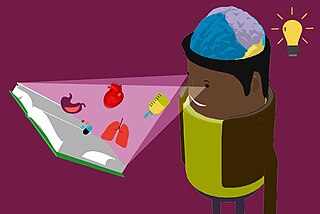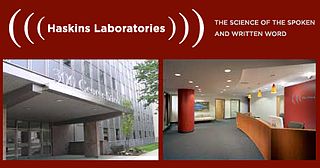The following outline is provided as an overview and topical guide to linguistics:
Psycholinguistics or psychology of language is the study of the interrelation between linguistic factors and psychological aspects. The discipline is mainly concerned with the mechanisms by which language is processed and represented in the mind and brain; that is, the psychological and neurobiological factors that enable humans to acquire, use, comprehend, and produce language.
Cognitive science is the scientific study either of mind or of intelligence . Practically every formal introduction to cognitive science stresses that it is a highly interdisciplinary research area in which psychology, neuroscience, linguistics, philosophy, computer science, anthropology, and biology are its principal specialized or applied branches. Therefore, we may distinguish cognitive studies of either human or animal brains, the mind and the brain.

Dual-coding theory is a theory of cognition that suggests that the mind processes information along two different channels; verbal and nonverbal. It was hypothesized by Allan Paivio of the University of Western Ontario in 1971. In developing this theory, Paivio used the idea that the formation of mental imagery aids learning through the picture superiority effect.

Haskins Laboratories, Inc. is an independent 501(c) non-profit corporation, founded in 1935 and located in New Haven, Connecticut, since 1970. Haskins has formal affiliation agreements with both Yale University and the University of Connecticut; it remains fully independent, administratively and financially, of both Yale and UConn. Haskins is a multidisciplinary and international community of researchers that conducts basic research on spoken and written language. A guiding perspective of their research is to view speech and language as emerging from biological processes, including those of adaptation, response to stimuli, and conspecific interaction. Haskins Laboratories has a long history of technological and theoretical innovation, from creating systems of rules for speech synthesis and development of an early working prototype of a reading machine for the blind to developing the landmark concept of phonemic awareness as the critical preparation for learning to read an alphabetic writing system.
Alvin Meyer Liberman was born in St. Joseph, Missouri. Liberman was an American psychologist. His ideas set the agenda for fifty years of psychological research in speech perception.
Ignatius G. Mattingly (1927–2004) was a prominent American linguist and speech scientist. Prior to his academic career, he was an analyst for the National Security Agency from 1955 to 1966. He was a Lecturer and then Professor of Linguistics at the University of Connecticut from 1966 to 1996 and a researcher at Haskins Laboratories from 1966 until his death in 2004. He is best known for his pioneering work on speech synthesis and reading and for his theoretical work on the motor theory of speech perception in conjunction with Alvin Liberman. He received his B.A. in English from Yale University in 1947, his M.A. in Linguistics from Harvard University in 1959, and his Ph.D. in English from Yale University in 1968.
Susan Brady is an American psychologist and literacy expert who is a professor of school psychology at the University of Rhode Island. For many years, she led the Haskins Literacy Initiative at Haskins Laboratories in New Haven, Connecticut which promotes the "science of teaching reading." She has been a leading researcher in the area of reading acquisition for over thirty years and has been involved with efforts to improve state and national policy on the teaching of reading including speaking before a U.S. Senate committee.
Michael T. Turvey was the Board of Trustees' Distinguished Professor of Experimental Psychology at the University of Connecticut and a Senior Scientist at Haskins Laboratories in New Haven, Connecticut. He is best known for his pioneering work in ecological psychology and in applying the dynamical systems approach to the study of motor behavior. He was the founder of the Center for the Ecological Study of Perception and Action. His research spans a number of areas including: dynamic touch and haptics, interlimb coordination, visual perception and optic flow, postural stability, visual word recognition and speech perception. Along with William Mace and Robert Shaw, he was one of the leading explicators of the ecological psychology of J. J. Gibson. His pioneering work with J. A. Scott Kelso and Peter N. Kugler introduced the physical language of complex systems to the understanding of perception and action. He also helped introduce the ideas of the Russian motor control theorist Nikolai Bernstein and his colleagues to a larger audience. Working with Georgije Lukatela and other colleagues at Haskins Laboratories, he exploited the dual nature of the Serbo-Croatian orthography to help understand word recognition.
Donald P. ShankweilerArchived 2006-06-26 at the Wayback Machine is an eminent psychologist and cognitive scientist who has done pioneering work on the representation and processing of language in the brain. He is a Professor Emeritus of Psychology at the University of Connecticut, a Senior Scientist at Haskins Laboratories in New Haven, Connecticut, and a member of the Board of Directors Archived 2021-01-26 at the Wayback Machine at Haskins. He is married to well-known American philosopher of biology, psychology, and language Ruth Millikan.
Isabelle Yoffe Liberman (1918–1990) was an American psychologist, born in Latvia, who was an expert on reading disabilities, including dyslexia. Isabelle Liberman received her bachelor's degree from Vassar College and her doctorate from Yale University. She was a professor at the University of Connecticut from 1966 through 1987 and a research associate at the Haskins Laboratories.
Leonard Katz (1938–2017) was an American experimental psychologist, born in Boston, Massachusetts. He was a professor of psychology at the University of Connecticut (1965–2006) and then professor emeritus until 2017. He was a Fellow of the American Association for the Advancement of Science and the Association for Psychological Science.
Catherine Alexandra McBride,, is a Professor of Developmental Psychology and the Associate Dean for Research for the College of Health and Human Sciences at Purdue University. She is also an Emeritus Professor of Psychology at the Chinese University of Hong Kong (CUHK), where she previously held the Choh-Ming Li Professorship of Psychology. Mcbride specializes in the acquisition of early literacy skills. She received her BA in psychology from Oberlin College, Oberlin, Ohio. She received her MA in 1992 and PhD in 1994 from the University of Southern California, and completed a post-doctoral fellowship at Florida State University in Tallahassee, Florida. She has written two books (namely, Children's Literacy Development and Coping with Dyslexia, Dysgraphia and ADHD: A Global Perspective and co-edited three others. She is currently the Past-President of the Society for the Scientific Study of Reading.
The orthographic depth of an alphabetic orthography indicates the degree to which a written language deviates from simple one-to-one letter–phoneme correspondence. It depends on how easy it is to predict the pronunciation of a word based on its spelling: shallow orthographies are easy to pronounce based on the written word, and deep orthographies are difficult to pronounce based on how they are written.
Rapid automatized naming (RAN) is a task that measures how quickly individuals can name aloud objects, pictures, colors, or symbols. Variations in rapid automatized naming time in children provide a strong predictor of their later ability to read, and is independent from other predictors such as phonological awareness, verbal IQ, and existing reading skills. Importantly, rapid automatized naming of pictures and letters can predict later reading abilities for pre-literate children.
Kenneth R. Pugh is president, director of research, and a senior scientist at Haskins Laboratories in New Haven, Connecticut and professor in the Department of Psychology at University of Connecticut. He is also an associate professor in the Department of Linguistics at Yale University, an associate professor in the Department of Diagnostic Radiology at the Yale School of Medicine, and director of the Yale Reading Center. Pugh is a cognitive neuroscientist and experimental psychologist who is best known for his work on the neural, behavioral and cognitive underpinnings of reading and other cognitive activities.

Embodied cognition is the concept suggesting that many features of cognition are shaped by the state and capacities of the organism. The cognitive features include a wide spectrum of cognitive functions, such as perception biases, memory recall, comprehension and high-level mental constructs and performance on various cognitive tasks. The bodily aspects involve the motor system, the perceptual system, the bodily interactions with the environment (situatedness), and the assumptions about the world built the functional structure of organism's brain and body.
Bilingual lexical access is an area of psycholinguistics that studies the activation or retrieval process of the mental lexicon for bilingual people.
Iris Berent is an Israeli-American cognitive psychologist. She is a Professor of Psychology at Northeastern University and the director of the Language and Mind Lab. She is among the founders of experimental phonology—a field that uses the methods of experimental psychology and neuroscience to study phonological competence. She has also explored the role of phonological competence in reading ability and dyslexia. Her recent work has examined how laypeople reason about innate knowledge, such as universal grammar.
Kathleen Rastle is a cognitive psychologist and Professor of Cognitive Psychology at Royal Holloway, University of London where she was previously the Head of Department of Psychology (2015-2019). Her research has made fundamental contributions to understanding of reading and learning to read.


